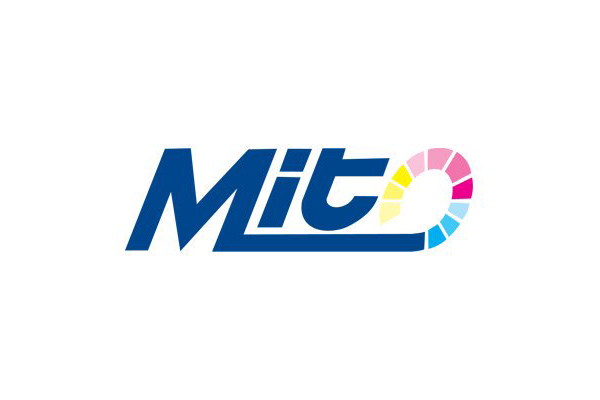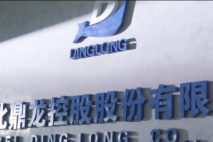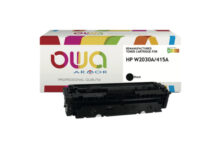On February 1, 2023, China Labor Watch (CLW) released a 46-page report detailing the poor working conditions at the Mito Color Imaging and Retech factories in Zhuhai, China. The report, Abuse in the Printing Supply Chain: An Investigation into Two Toner Cartridge Manufacturers in Zhuhai can be downloaded here. CLW is a not-for-profit, nongovernmental organization (NGO) that monitors working conditions in Chinese factories. The watchdog group dispatched undercover inspectors to the Mito Color and Retech factories, which are subsidiaries of the Chinese specialty-chemical maker Hubei Dinglong, a publicly traded company listed on the Shenzhen Stock Exchange. The CLW inspectors recorded a laundry list of violations of China’s labor laws ranging from failure to pay required overtime and social insurance to hiring underaged workers to discrimination and psychological abuse.
CLW is a not-for-profit, nongovernmental organization (NGO) that monitors working conditions in Chinese factories. The watchdog group dispatched undercover inspectors to the Mito Color and Retech factories, which are subsidiaries of the Chinese specialty-chemical maker Hubei Dinglong, a publicly traded company listed on the Shenzhen Stock Exchange. The CLW inspectors recorded a laundry list of violations of China’s labor laws ranging from failure to pay required overtime and social insurance to hiring underaged workers to discrimination and psychological abuse.
CLW’s latest publication follows a similar report released by the NGO in 2021 detailing appalling conditions at two third-party cartridge production facilities. Investigators were sent to the Zhuhai National Resources & Jingjie Printing Technology factory and the Zhuhai Maetone Infotech plant. (see “China Labor Watch Finds Bleak Working Conditions at Certain Chinese Cartridge Factories”). While Chinese third-party cartridge producers face increasingly difficult market conditions, CLW said its inspectors are finding working conditions at Zhuhai cartridge factories deteriorating as “manufacturers desperately search for ways to cut production costs.”
The Latest Report
To assess the current state of “labor rights and the environmental impact” of Zhuhai’s third-party cartridge industry, CLW inspectors worked “several weeks” at the Mito Color and Retech factories. While staffing production lines, eating in the factory cafeterias, and living in the dormitories, CLW inspectors interviewed nearly 60 factory workers. The report catalogs numerous infractions of China’s labor laws and regulations at the factories, including:
- employment of underage workers;
- discrimination against various ethnic groups;
- denying earned wages and sick time;
- failure to purchase required social security insurance;
- excessive unpaid overtime;
- disregarding contractional obligations;
- ignoring accurate payroll reporting;
- inadequate health and safety training;
- unsafe working conditions;
- workplace psychological abuse;
- discharge of contaminated wastewater from the factories; and
- other violations.
To rectify the conditions at the Mito Color and Retech plants, CLW made a series of recommendations. It called on the firms to immediately comply with relevant labor laws in China and provide all workers with formal labor contracts that spell out relevant terms and conditions of employment. The NGO said the factories have to provide workers with accurate payroll accounting, adequate social security benefits, and sick leave. “More importantly, both companies need to put an end to excessive overtime; to reimburse all workers for overtime pay that has been neglected over the past few years; and to provide statutory overtime pay for anything past the eight-hour mark.”
In addition to calling for fair compensation, CLW asked Mito Color and Retech to “provide a friendlier, safer work environment where workers’ voices can be better represented.” The group said the factories must eliminate gender and ethnic discrimination in recruitment. It also said the firms must stop using what it called “frauds in safety training” and instead devise a real system that prevents occupational and work-related injuries. “These factories must also put an end to workplace psychological abuse against workers and the ‘management by discipline’ practice,” CLW stated.
Regarding the contaminated wastewater, CLW said that the two factories should engage a third-party to conduct environmental testing and release the results “to the public and community residents in a timely manner to increase transparency and accountability.” The NGO further cautioned the factories to pay close attention to toner dust and other materials that could be potentially harmful to workers and residents living around the plants.
Beyond its recommendations to Mito Color and Retech, CLW urged companies that import third-party cartridges from China to insist all manufacturers “strictly abide by labor standards and conduct regular inspections” to monitor conditions at the factories. In particular, CLW told online retailers to “join us and take these recommendations seriously as we all want to eliminate labor rights infringement” in the third-party consumables industry. In addition to enlisting the aid of the industry’s customers and channel partners, CLW said, “We also call for the Chinese government to strengthen the protection of the rights and interests of Chinese workers, strictly enforce labor laws, increase penalties for violations of labor laws, form a real deterrent to enterprises, and to strengthen industry supervision mechanisms.”
Mingtu = Mito Color
Doing business as Mito Color Imaging Co., Ltd., Zhuhai Mingtu Technology Company was the first company Hubei Dinglong acquired when it moved into manufacturing finished toner cartridges. According to our research, Mito Color was established in Zhuhai in 2003 and became known for producing high-quality color toner cartridges. After taking a 20 percent stake in the company in 2012, Hubei Dinglong completed its acquisition in 2013 at a cost of approximately CNY 145 million—or about $23 million. Initially as a Hubei Dinglong subsidiary, Mito Color experienced strong growth. However, after several years sales began to falter at the company, and Hubei Dinglong was forced to write-off hundreds of millions of yuan renminbi in goodwill and inventory in 2019 and 2020 due in part to Mito Color’s poor sales. Since the write-offs, Hubei Dinglong has reported to investor in its financial disclosures that business has improved at Mito Color. Our research indicates that the subsidiary has cut the price of its toner cartridges to regain lost market share. Hubei Dinglong has reported that in addition to growing revenue, its subsidiary has achieved new production efficiencies, which have allowed it to improve the profitability of Mito Color’s products.
Since the write-offs, Hubei Dinglong has reported to investor in its financial disclosures that business has improved at Mito Color. Our research indicates that the subsidiary has cut the price of its toner cartridges to regain lost market share. Hubei Dinglong has reported that in addition to growing revenue, its subsidiary has achieved new production efficiencies, which have allowed it to improve the profitability of Mito Color’s products.
The investigation results published by CLW suggest that one way Mito Color has improved its profitability has been through paying very low wages and demanding long work hours without paying overtime. According to the CLW report, the average monthly salary at Mito Color’s manufacturing subsidiary, Zhuhai Union Tianrun Print Consumable Co., Ltd., is between CNY 4,000 and CNY 5,000—or roughly between $600 and $750. While the rate is more than double Zhuhai’s monthly minimum wage, it is less than half the city’s average monthly salary, which ChinaDaily.com.cn reported in July 2022 to be over CNY 10,000. CLW reported the hourly rate was CNY 17 ($2.50) and no overtime was paid in violation of Chinese law.
CLW said workers at the Mito Color plant eat for free at the factory cafeteria during working hours but had to pay for breakfast. They received no additional subsidiary if they take their meals off-campus. While workers could live for free in the company dormitory, they were required to pay a CNY 3 ($0.44) per day fee for water and electricity. Those choosing to live off-campus received a CNY 30 ($4.42) monthly subsidy. The report said, “The dormitory had 2-6 people in each room and had four floors, including more than 60 male and more than 40 female workers.” Each room was air conditioned, according to the report, and the dorms also had showers, hot water, and toilets. Dorm residents get bed frames but were required to purchase their own mattresses.
While there were some hourly workers on Mito Color’s lines, most labor is done on a piecemeal basis. CLW reported production lines must hit daily targets and if the targets are not met then the line workers must put in additional hours, for which they do not get paid overtime. The workday begins at 8:30 am and CLW reported, “It was common to work overtime until 9–10 pm depending on whether the daily production target was reached.” Beginning in September, days could be even longer and “might exceed 15 to 16 hours per day,” the report quoted one worker as saying.
The work week was six days long but could be extended to 14 days with a day off per month. Line workers also might be required to work holidays without any overtime pay. “The total overtime hours was, on average, 121 hours per month,” CLW reported. “The actual monthly overtime hours far exceeded the legal limit of 36 hours. But their average monthly salary was only about 4,100 RMB.”
During the recruiting process, CLW inspectors took note of several violation of Chinese labor laws. For example, the CLW report said the factory hires workers as young as 17 years old, while labor laws stipulate children must be 18 years old to work in a factory full-time. Recruiters also indicated that quotas for four ethnic groups—Tibetans, Uyghurs, Hui, and Zhuang—were full so they could not be hired. CLW reported that the inspectors encountered “no employees from the four ethnic groups above” in the factory. According to CLW, Article 12 of China’s Labor Law stipulates that ”workers shall not be discriminated against in employment based on their ethnicity, race, gender, or religious belief.”
Formal workers at Mito Color reportedly signed labor contracts, but CLW said the contracts were invalid because “some sections were left blank in the body of the contract, and the contracts also lacked specific interests and obligations.” The workers were not given time to fully peruse the contracts and they were not given copies of the signed documents to refer to if there was a dispute. CLW said that in violation of the law, temporary workers were not given employment contracts. The same practices were observed at the second Hubei Dinglong subsidiary monitored by the CLW inspectors as we discuss below.
Our understanding is that under Chinese law employers are required to pay various social insurances, including unemployment, medical, maternity, and other insurance. Employers are also required to contribute to China’s so-called Housing Provident Fund, which was established so employees could pay for and maintain their own homes. Formal fulltime employees at Mito Color, CLW reported, had a social insurance deduction of CNY 320.44 ($47.24) deducted from their monthly pay. No contribution was made to the housing fund, however. Mito Color did not contribute to the social insurances nor the housing fund for temporary workers, and no deduction was taken from their monthly pay.
A recent post on China Labour Bulletin (CLB), a Hong Kong-based watchdog group monitoring working conditions in China, suggests that failure to make the proper social insurance contributions is common. “The lack of social insurance coverage stems from the failure of enterprises, small- and medium-sized enterprises in particular, to provide employees with their legally mandated benefits.” CLB says local governments frequently turn “a blind eye to non-payment” so they can curry favor with factories and attract investment.
Chaojun = Retech Technology
The second Hubei Dinglong subsidiary that CLW investigated was Zhuhai Chaojun Technology Co., which does business as Retech Technology International. Established in Shenzhen in 2001, Retech was among the first companies in China to bring to market new-build toner cartridges for printers and MFPs. Retech was acquired by Hubei Dinglong in 2016 and relocated to Zhuhai in 2020. The Retech acquisition expanded Hubei Dinglong’s catalog of product offering to include lower-end products for emerging markets. Like Mito Color’s business, Retech’s business slumped after it was acquired, and Hubei Dinglong was forced to write down the value of goodwill and inventory at the same time it took the Mito Color write-offs mentioned earlier. And similar to what it has said about Mito Color, Hubei Dinglong has reported Retech’s revenue and profitability has improved. Similarities were noted during the Retech job recruitment process mirroring those at the Mito Color factory. For example, the investigators found that applicants under the age of 18 were recruited to work at Retech. And workers under the age of 18 were allowed to work in the same positions as adult workers. As noted, the CLW inspectors also reported that both Mito Color and Retech neglected to follow Chinese labor law governing employment contracts.
Similarities were noted during the Retech job recruitment process mirroring those at the Mito Color factory. For example, the investigators found that applicants under the age of 18 were recruited to work at Retech. And workers under the age of 18 were allowed to work in the same positions as adult workers. As noted, the CLW inspectors also reported that both Mito Color and Retech neglected to follow Chinese labor law governing employment contracts.
One big difference CLW investigator found between Mito Color and Retech was that Retech workers were required to labor more hours than their counterparts at Hubei Dinglong’s other toner cartridge subsidiary. For six days per week, CLW reported that line Retech workers are required to labor from 8:30 am until 10 pm with breaks for lunch and dinner. Time worked beyond 10 pm was considered overtime. Workers labor nine hours on Sunday, starting at 8:20 am and working until 5:30 pm. “At most,” CLW said workers were given one day off “each month, sometimes no rest day was offered.” The NGO estimated on average workers put in 387 hours each month. The report said there was “no overtime pay for work on statutory holidays, weekends, etc.”
Although Retech workers spend almost 40 percent more time at work than those at Mito Color, CLW inspector found the average monthly salary for Retech workers was just over CNY 4,000 ($590). The Retech employee handbook indicated that formal workers did receive social insurance benefits. However, because workers were not given pay slips, CLW said it was impossible for inspectors to determine if deductions for social insurance and the housing fund were made of if Retech made similar contributions.
Like Mito Color, Retech provides free room and board to its factory workers. CLW said,” If an employee chose not to live in the company dormitory, there was a monthly rent subsidy of CNY 30 per month.” As described by the CLW inspectors, living conditions in the Retech dorms were spartan. The rooms featured eight beds and had up to six occupants. The rooms were air conditioned and had fans but there were no desks or lockers. Occupants stored personal items on vacant beds. Employees believed that their meals were free but didn’t know for certain if meal deductions were made from their wages because they did not receive a monthly pay slip recording hours worked and deductions.
Occupational Hazards
CLW inspectors found a conspicuous lack of safety training at both Mito Color and Retech. The report said, “There was a high workers turnover; and the company was not willing to increase the training cost.” On the first day of employment, a new worker could be placed on a production line at either factory. Unfortunately, the inspectors found first-aid kits lacking at both factories, although they were available in the dormitories.
Reading the report suggested that the production lines at Mito Color and Retech were not extremely dangerous. The factories were not without risks, however. Workers in the packaging shop at Retech, for example, used equipment with surfaces temperatures that could get up to 100 degrees Celsius, which presented burn hazards. Similarly, workers could encounter toner particles, which could do damage to their respiratory tracts. According to the report, “After repeated exposure and inhalation of these particles into the human body, workers’ cancer risks were several times higher than that of the average person.”
The CLW inspectors also reported encountering loud noise at each facility. According to the report, “The workers at both factories generally reported that the noise on the production line in the workshops was as high as 100 decibels for extended periods of time,” and noise-canceling protection gear was not provided. More concerning was the observation that “to ensure effective communications among the workers, management such as production line leaders or quality inspection would also require workers not to wear earplugs.”
In addition to the hazards inside the factories, CLW inspectors raised concerns about effluent discharged from the factories. Zhuhai is located on the vast Pearl River Delta (PRD) and water pollution is a huge problem in the region. Quoting data from the World Bank, The Economist reported that cities around the PRD make up the world’s biggest megacity and generate a quarter of all of China’s export. The PRD has suffered as these industries have flourished and the Chinese government has invested heavily to clean up the water resources with some success. Zhuhai and other PRD cities still face water shortages because of increased pollution and salinity.
According to CLW, manufacturing ink and toner cartridges can generate large amounts of organic pollutants if the wastewater from cartridge factories isn’t treated. The NGO detailed in its report that wastewater from these plants must follow the directives of the “Discharge Standard of Water Pollutants for Printing Ink Industry (GB25463-2010) issued by the Ministry of Ecology and Environment of the People’s Republic of China.” The inspectors who monitored conditions at the Mito Color and Retech factories obtained wastewater samples from each facility and the samples were tested by what CLW called a “professional testing facility.” The results indicated that the wastewater contained concentrations of various pollutants such as petroleum and aniline that far exceeded the legal levels set by the Chinese authorities. CLW pointed out that Hubei Dinglong has been fined twice by the Wuhan Ecological Environment Bureau. “The fine was CNY 3.026 million RMB in total,” CLW said. One of the firm’s subsidiaries was also fined for wastewater violations in Zhuhai (see “Jinglong Printing Consumables Fined ¥100,000 for Wastewater Violations”).
Sad Testimony
CLW’s report is replete with commentary from what sounded like desperate and tired workers, especially those at the Retech plant. Quotes from workers often expressed frustration over receiving low pay and the lack of overtime. Moreover, workers at both factories complained about degrading comments made by line managers and others in positions of authority.
A worker at the Retech plant told an inspector, “It is too harsh. I have just quit my job and I can leave in a month. I wish I don’t have to work so late at night, and that I can take one day off per week.” Another said, “This is the most tiring job I’ve ever done. I’ve never slept enough in the past few days. I wish that it will be at most seven or eight o’clock at night, and that I can have one day off per week.” Saying that the hours were too long and complaining that he was not given a pay slip, one Retech worker called the plant a “black factory (黑工厂),” a derogatory Chinese term used to describe factories that exploit workers.
To make matters worse, respect for line workers was found to be sorely lacking by the CLW inspectors. At Mito Color, inspectors reported line managers being “abusive and threatening,” and the company routinely used “public notices of criticism, warnings, minor demerits, major demerits, and dismissal” as disciplinary tools. At Retech, the inspectors said workers “often received verbal violence and insults from the management of their assembly line.” Some workers were forced to work alone late into the night as a form of punishment and they were threatened with dismissal. Retech workers could also be disciplined for infractions that seemed rather arbitrary like “bad conduct and immorality.” CLW said that lacking a clear definition of an offense allowed employers to terminate workers without compensation.
Our Take
Reporting about abhorrent working conditions in factories abound and are by no means limited to China. There have been plenty of reports about U.S. plants exploiting workers, along with abuses elsewhere around the world. Still, anyone following manufacturing in China understands that working conditions and pay in China are not the same and fall short of those in a factory in France, for example. And problematic working conditions in Chinese factories are not exclusive to the third-party supplies industry. Irrespective if a manufacturer is making cell phones or footwear—or anything else—reports are common of stressed factory workers in China laboring endlessly for meager pay.
Although we never thought that line workers in China’s third-party cartridge industry had it easy, CLW’s reports have been eye opening. The NGO has now inspected at least four cartridge factories that we know of, and the reports consistently detail bleak conditions. Working on a cartridge production line in Zhuhai may not be life threatening, but if CLW’s reports are to be believed—and we think they are—it is clear that tens of thousands of people are making cartridges under adverse conditions and for low pay.
What is surprising is that the situation remains so regressive at Hubei Dinglong’s subsidiaries. The parent company seems to have turned a corner and recently announced it expects to record a sharp increase in net profits in fiscal-year 2022 (see “Hubei Dinglong Expects Robust Net Profit Growth in FY 2022”). We estimate revenue from the company’s cartridge business grew almost 10 percent last year and the company said that “the profitability increased significantly” from cartridge sales, although it did not provide any numbers. If true, it will mark the company’s second sequential year of strong growth (see “Hubei Dinglong Reports Huge Upturn in Revenue and Net Profit in FY 2021”).
It will be interesting to see how the industry responds to CLW’s latest report. Last time, we heard little from the companies that the NGO inspected, although there were some in the Chinese industry press that faulted Actionable Intelligence for writing about CLW’s report. While we would not be surprised if this post gets a similar negative reaction, we caution detractors against “shooting the messenger.” Blaming the bearer of bad tidings is an easy strategy but one that solves nothing. Instead, it would be refreshing to hear from Mito Color and Retech and learn what they have to say about CLW’s findings. Even more refreshing would be to learn that the companies will address the conditions presented in the CLW report.





